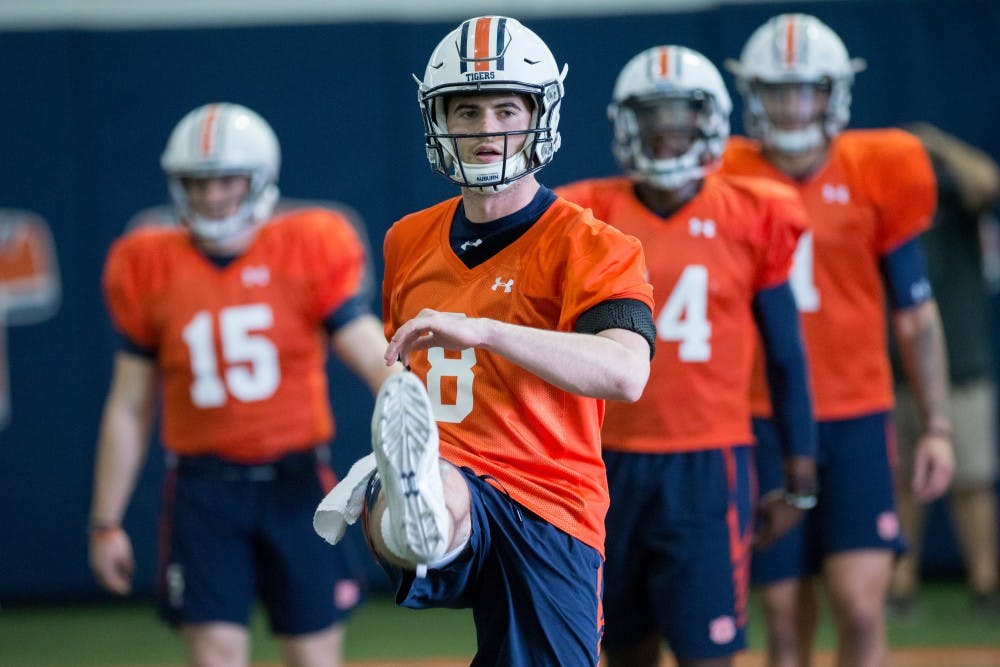Football has advanced and changed over the years, adapting to medical research and findings.
A study was conducted to determine whether fan interest would go down if regulations were implemented to increase players’ safety.
The study was performed by Auburn associate professor David Martin in the department of nutrition, dietetics and hospitality management, Gopi Deshpande, an electrical engineering associate professor at Auburn, Auburn psychology professor Jeffrey Katz and professors from other universities throughout the U.S.
Conducted in Auburn’s fMRI machines, participants were shown images of violence both related and unrelated to football. Some participants were hardcore football fans, while others had never even heard of the sport.
After classifying the images, researchers were able to see how the brain was in play during the viewing of the violent images.
When talking to some of the participants after, Martin said he found it interesting that many were affected by the non-football related images but said nothing about the violent football images.
“Non-fans were looking at both sets of violent images and reacting the same way, whereas the football fans were looking at the violent image of the football field, and it was sanitized or they were desensitized to it,” Martin said.
Because the brain cannot tell a lie, Deshpande said, fMRI scanning is much more accurate than a self-report would be.
“I think one of the main takeaways was that, OK yes, we saw less response to football violence,” Deshpande said. “The important thing is where in the brain did we see the less response? And those regions that we saw less response to football violence in fans, we know from prior studies are actually involved in empathy. So, what it indicated is that they were unable to empathize with football players.”
Because fans have become desensitized, they often do not even realize they lack the empathy necessary to see players as true humans playing a game.
Martin reiterated that in most situations, even through college football, the players are ultimately children who are suffering serious brain damage during gameplay.
Many players who succeed in football experience the effects years later.
Chronic traumatic encephalopathy results in early onset dementia in those who have experienced a lot of brain damage.
This often manifests in football players due to the number of head injuries they receive.
Currently, there is no way to know what the risk is to players in developing CTE later in life, as the only tests available are performed post mortem. However, researchers are working on non-invasive tests for one’s blood or saliva, Martin said.
“We may find out that it’s not that bad, that the risk isn’t that high and nothing really needs to change,” Martin said. “But, if we do find out that the risk is high and that 50 percent of these student-athletes, student being first, are doing permanent brain damages to themselves, I would want people to at least be open. We need to accept that, and accept that medical research and be open to changes. Protect those players.”
Martin shared the story of Kuiu founder Jason Hairston, who died in 2018. Hairston was beginning to show the effects of brain damage due to his football injuries.
He couldn’t even remember how to drive his own son to school. The news was overwhelming, and he took his own life as a result.
Many parents do not let their children play football due to the high risk, despite being fans of the game.
“When I came to Auburn, I didn’t know a lot about football,” Deshpande said. “So we met another family who are big, great Auburn fans. My wife asked, ‘Oh, then is your son also going to, is he considering football?’ ‘No, we don’t let him play football. It’s too dangerous’. The takeaway from that is as [Martin] was saying, look at the players as humans. This is the takeaway for me. What if that player was my son or father or brother? Then how would you look at it? You would look at it completely differently.”
Ultimately, the researchers said awareness is the first step in realizing that changes may be in the future for America’s most beloved sport.
While these changes may occur incrementally, Martin said he wouldn’t be surprised if football was ultimately litigated out within 15 to 20 years.
“I think the vast majority of fans even don’t know that they are desensitized to violence in the game,” Deshpande said. “The first step would be to actually raise the awareness that this is, in fact, the case. You’re actually not able to see the amount of violence that is actually going on.”
The question arises, however, why are fans desensitized to the violent images and ultimately, the violence in football in the first place?
“Being a fan is largely a social group definition,” Martin said. “Part of being a fan, the motivation of being a fan is you want to be a part of that membership in that group.”
If a new fan is unfamiliar with the game and they see the violence on the field but it is considered normal by their friends, they will associate that as normal, as well, Martin said.
Deshpande reaffirmed this with the idea that many learn the importance and love of the game from their parents or family. A child sees his parent excited about a particular hit or tackle and associates a positive energy with that.
If changes to the game were made in small, incremental steps, Deshpande believes fans could eventually come to accept the revisions to the game.
“I personally think that when you look at how big and fast and strong football players are today, that you would need [changes] to really make the sport safe,” Martin said. “You would really need to fundamentally change how it’s played.”
Do you like this story? The Plainsman doesn't accept money from tuition or student fees, and we don't charge a subscription fee. But you can donate to support The Plainsman.





